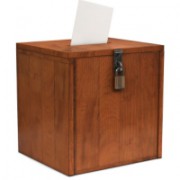 Voting in Germany used to be easy. As every German student knows, you have two votes – one for a candidate and one for a political party.
Voting in Germany used to be easy. As every German student knows, you have two votes – one for a candidate and one for a political party.
At least, that makes it easy for the electorate, because they can vote for someone they like, but still express a preference for a different party to have a majority in parliament.
For those working out the make of the parliament, there is a highly complex formula that determines how many seats each party gets, and depends on the number of direct mandates that individual candidates achieve, leading to the infamous Überhangmandate, which are worth a post all by themselves one day.
Until a few years ago, when some parts of Germany – Hessen included – introduced something call “Kumulieren und Panaschieren”.
Put simply: in the forthcoming local election I have 45 votes to cast. The ballot sheet is A2 size and has 207 candidates on it, grouped by political party. (Residents in Frankfurt have 93 votes and apparently the voting booths have had to be widened so that the ballot sheet fits on the table!)
I can give my 45 votes to any of those 207 candidates. I do not have to use up all 45, but I cannot give more than 45.
To make life simpler, I can just put a cross against a party and all of my votes will be distributed amongst their candidates – something I am sure many people do.
 But I am not restricted to one party, I can distribute my votes across candidates from all 6 of the parties on the ballot sheet. This is called Panaschieren.
But I am not restricted to one party, I can distribute my votes across candidates from all 6 of the parties on the ballot sheet. This is called Panaschieren.
As if that was not enough, I can also give up to 3 votes per candidate, as long as the total number of votes does not exceed 45. This is called Kumulieren.
It is when you combine the two that the real fun starts!
You can
- put a cross against a party, but cross-out one or more of their candidates
- put a cross against a party, cross-out one or more of their candidates and re-distribute those votes to candidates from other parties
- put a cross against a party, cross-out one or more of their candidates and re-distribute those votes to other candidates from the same party
- vote for a party with less than 45 candidates, and give some of the votes to candidates from other parties
It is no wonder that people get confused, and voting takes longer than ever – it makes “first part the post” look like a picnic!




Thanks, Graham for your hard work
I lived in Germany for 6 years, Bielefeld, and Munster in the 70’s. Loved my time there.
Keep up the good work.
Regards Steve.